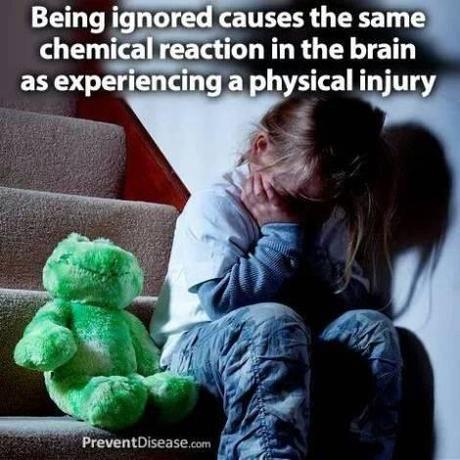
“Being excluded or ostracized is an invisible form of bullying that doesn’t leave bruises, and therefore we often underestimate its impact,” “Being excluded by high school friends, office colleagues, or even spouses or family members such as parents can be excruciating. People and clinicians need to be aware of this so they can avoid depression or other negative experiences.” Apparently When a person is ostracized, the brain’s dorsal anterior cingulate cortex, which registers physical pain, also feels this social injury. ”How can it be that such a brief experience, even when being ignored and excluded by strangers with whom the individual will never have any face-to-face interaction, can have such a powerful effect? People vary in how they cope with this. Coping can mean the person tries to harder be included. For example, some may be more likely to engage in behaviors that increase their future inclusion by mimicking, complying, obeying orders, cooperating or expressing attraction. If they feel there is little hope for re-inclusion or that they have little control over their lives, they may resort to provocative behavior and even aggression. Dealing with this type of bullying in school can be a challenge for kids because it causes so much pain to be excluded, especially at a time when peer relationships are so important. Not only do kids suffer socially, but they also can suffer academically. And if a child grows into an adult feeling worthless, rejected or less valued than others, this can cause all sorts of issues.
Although you cannot prevent your child from being ostracized, there are things you can do to help her if it does happen.
Here are some ways you can help your child cope with being ostracized at school:
Talk with your teen or tween. Make sure she feels comfortable sharing with you. Avoid overreacting or calling those excluding your child names. And don’t shame your child for being ostracized by indicating that she should be different somehow or that she should try harder to be liked. Instead, focus on listening and empathizing with how she is feeling.
Be sure your child can identify the difference between unkind behavior and bullying. Sometimes when kids are excluded, it’s not intentionally meant to harm your child. And even though it hurts to be left out, it does happen. Help your child determine if the kids at school were being unkind or bullying and making a deliberate effort to exclude her. Regardless of which situation your child experienced, don’t minimize the hurt she feels. Both experiences are painful and need to be dealt with.
Discuss what is controllable and what isn’t. Be sure your child realizes that she has no control over what other people say or do. But she can control how she responds. Work with your child to come with ideas on how to handle the situation and overcome bullying. The goal is that your child would not feel helpless but instead feel empowered with different options.
Give advice, but don’t “fix” things. It’s never a good idea for parents to take over in a situation, no matter how much you want to. Instead, let your children decide how they want to handle the situation. Demonstrate that you trust their decisions. This will go a long way in rebuilding self-esteem.
Seek out other friendships. Healthy friendships are one of the best ways to prevent bullying. Additionally, having at least one friend will give a child a sense of belonging, which can go a long way in erasing the impact of being rejected at school. Look for ways you can helpyour child develop friendships.
Encourage participation in outside activities. When your children are involved in outside activities, whether it’s sports, yearbook staff, a church group or a reading club, they not only have an opportunity to make friends, but they also are being self-confidence. Additionally, outside activities give kids the opportunity to release tension, develop creativity and blow off steam. Don’t underestimate the importance of getting your kids involved in activities outside of school. Consider outside help. Being socially rejected can affect your child in a number of ways including negatively impacting self-esteem. As a result, it is a good idea to get outside help. A pediatrician or a counselor can assess your tween or teen for depression as well as screen for thoughts of suicide. Even if your child appears fine to you, it never hurts to get a second opinion. I want to thank my dear friend Tina for the inspiration for this post ~Stay Strong~

